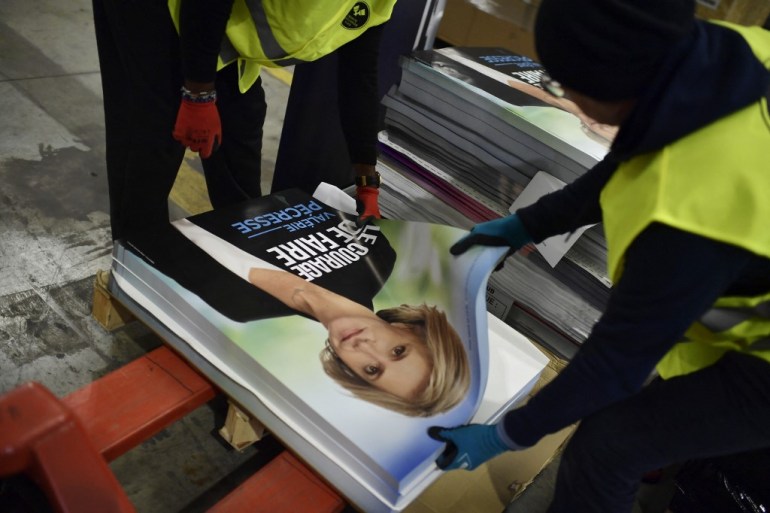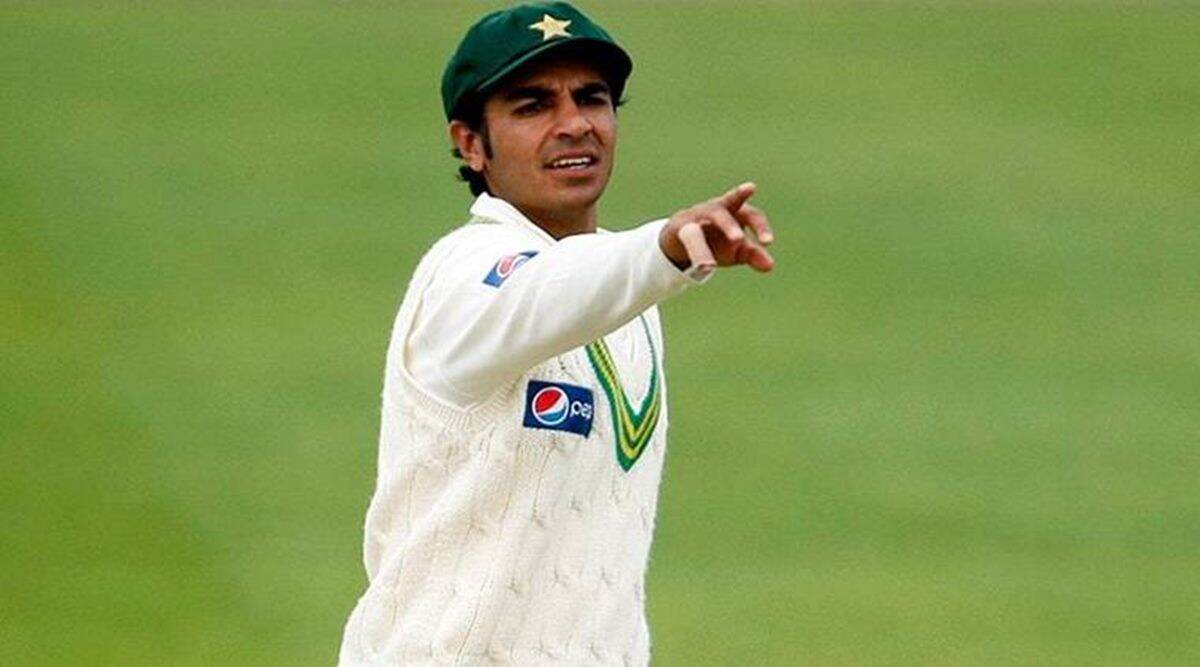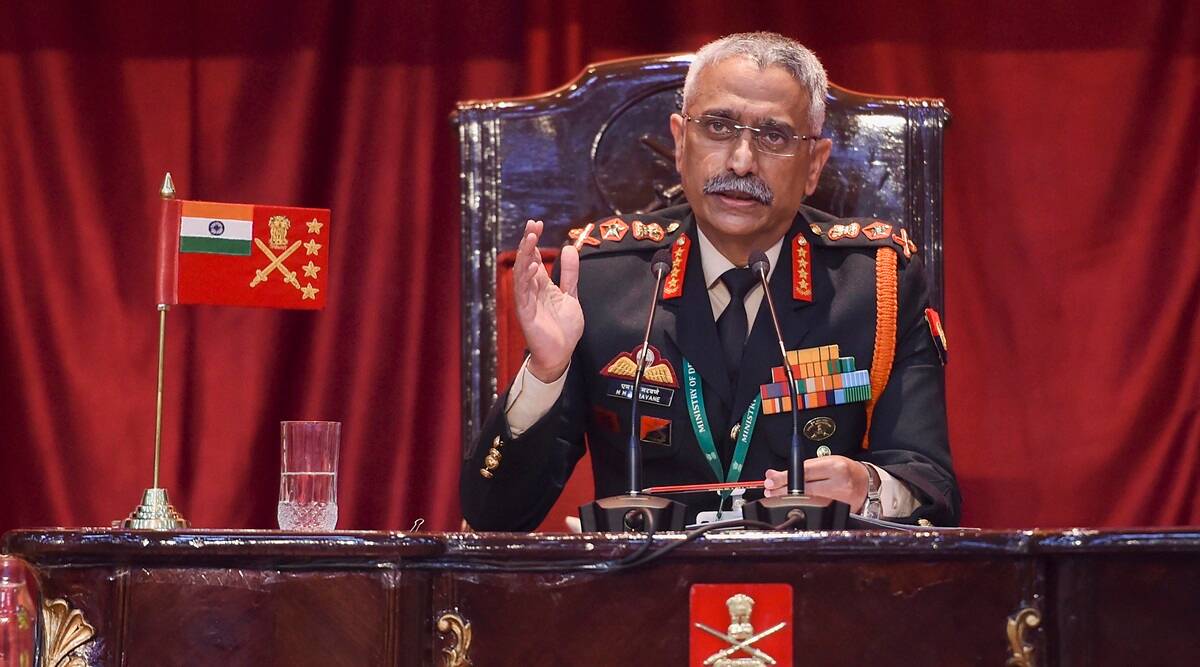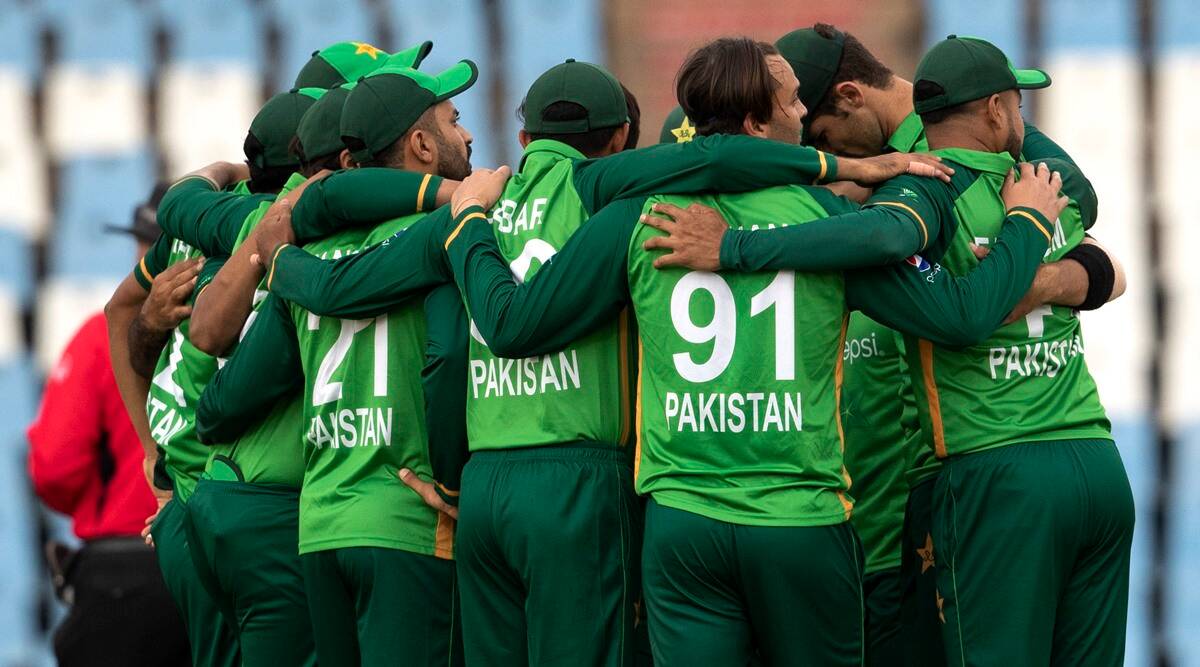Paris, France – As the 12 French presidential candidates edge closer to the first round of voting set to be held on Sunday, a number of them have pulled ahead of their counterparts.
In order to qualify for running, candidates secured the 500 endorsements from the 42,000 elected French officials needed to enter the race.
While incumbent President Emmanuel Macron is the favourite to win, he faces a repeat of the 2017 election when far-right candidate Marine Le Pen was presented as his biggest contender.
Philippe Marliere, a professor of French and European politics at University College London, told Al Jazeera the repeat scenario was a result of the “political realignment” caused by Macron leaving one of the two traditional parties that dominated the political scene, creating a centrist one.
Consequently, the traditional party on the left, the Socialist Party (PS), and the traditional party on the right, the Republican Party, both suffered setbacks in 2017, with many people switching their vote to Macron’s party.
“The realignment means that these two parties which dominated the political life until recently don’t have as much power as they used to,” Marliere said, adding that the setback was now confirmed in this election.
In the history of the Fifth Republic, there has never been a presidential candidate that has won outright by a majority. In keeping with past elections, the top two candidates will emerge on Sunday to compete for votes in the second round, which will be held on April 24.
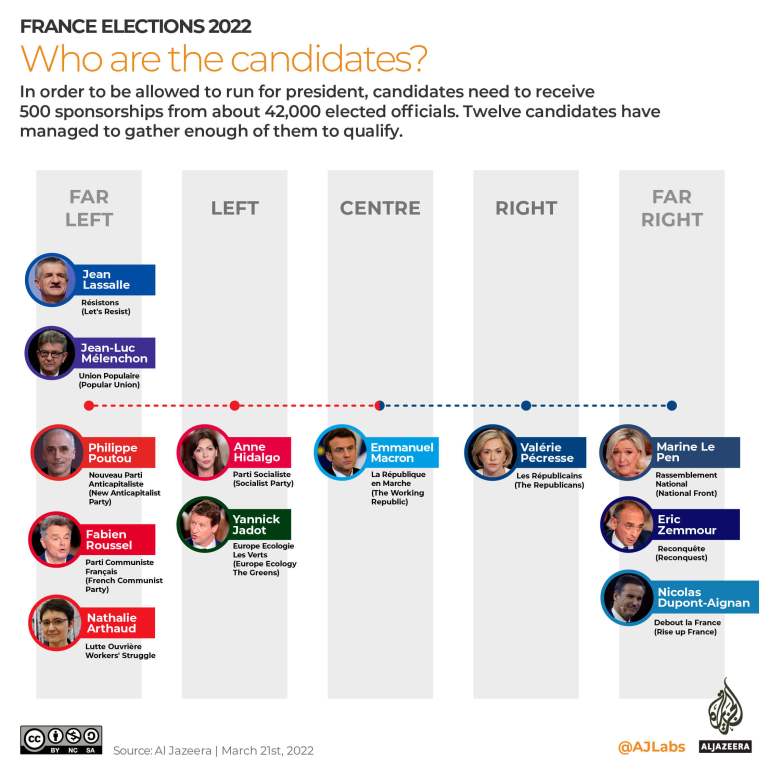
Here are the top five frontrunners:
Emmanuel Macron
The 44-year-old incumbent president has in recent weeks focused the majority of his time on shuttle diplomacy, with analysts saying Russia’s all-out war in Ukraine helped boost his profile.
The former investment banker, who became France’s youngest president in 2017, has shifted towards the right during his five-year term. He has promised tax cuts, benefits reform and a rise in the retirement age.
His party, La Republique En Marche (LREM), is pro-European and has managed to attract both traditionally left and right-wing voters.
Figures from the latest polls put him in first place with 26.8 percent of the votes.
Gaspard Estrada, a political analyst at the Science Po University, described Macron’s “resilience” in the polls.
“He has led the polls during the whole campaign and has been stable,” he told Al Jazeera.
But Philippe Marliere said Macron, who entered the electoral race at the last minute, should be “careful” not to appear complacent and condescending.
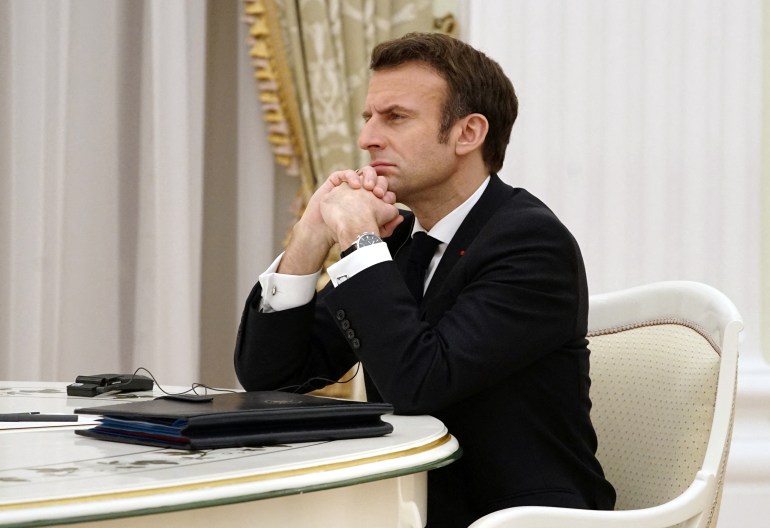
“The ‘war effect’ on his campaign is decreasing,” he said, pointing out that the gap between Macron and his most serious contender, Marine Le Pen, was getting smaller.
Macron held his first rally last Saturday at La Defense Arena stadium, where he appeared for the first time and addressed about 35,000 supporters.
“He might give the impression that he’s not taking this too seriously or might look down on this race, and that he is sure he’ll win so he feels like he doesn’t need to campaign,” Marliere said.
Marine Le Pen
The veteran far-right candidate from the rebranded Rassemblement National party – formerly the National Front – is in second place, at 21.9 percent.
This is Le Pen’s third presidential election, and many consider a defeat would put an end to the 53-year-old’s political career.
She has run a low-key campaign that has seen her tone down her usual hardline rhetoric on immigration, in favour of focusing on household income and purchasing power.
According to a survey by the Ipsos market research group, Le Pen and Macron will have a much smaller margin of difference in the second round of voting, projected at 48.5 percent versus 51.5 percent, respectively.
🇫🇷📊La dernière vague du rolling @IpsosFrance pour @franceinfo/@le_Parisien donne Macron à 26,5% (+0,5), Le Pen à 21% (=) et Mélenchon 16% (+0,5). Les intervalles de confiance Le Pen/Mélenchon se chevauchent, ce qui rend envisageable la qualification de ce dernier au second tour. pic.twitter.com/2Y6IF2Mtml
— mathieu gallard (@mathieugallard) April 4, 2022
Jean-Luc Melenchon
At 16 percent, the former Trotskyist and far-left leader of La France Insoumise (France Unbowed) party is polling the strongest among the left-wing candidates.
He is advocating for a 32-hour work week and for returning the pension age to 60.
Known as the “wise turtle”, the 70-year-old political veteran is a forceful speaker and debater, and has gained momentum in the run-up to the election. His chances of making it into the second round runoff are being taken seriously.
A pre-campaign attempt for the candidates on the left to unite behind a single name was inconclusive. Melenchon had always refused such unity.
“He has reaped the benefit of this strategy, of refusing unity with other left-wing parties, and now has become the third main choice,” Estrada said.
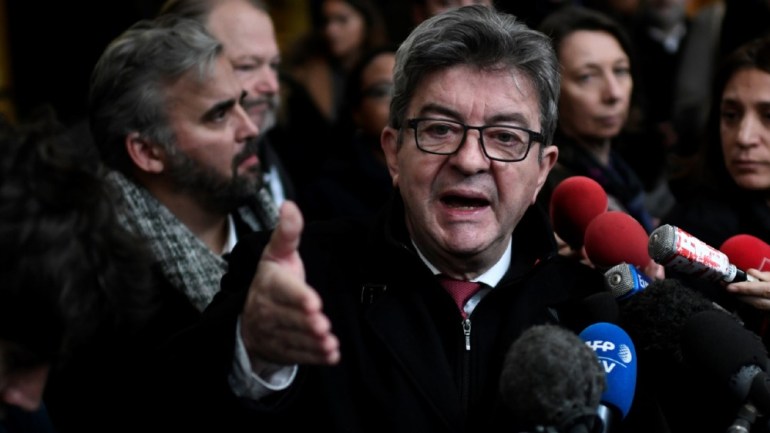
Eric Zemmour
The former TV pundit had entered the race with aplomb, and thanks to his virulent anti-Islam and anti-immigration views, initially posed as a threat to Le Pen’s traditional voter base and managed to draw supporters from the mainstream right.
However, according to the latest polls, his campaign has stumbled due to his uncompromising style, and he has slipped to fourth place at 10 percent.
“Voters got bored of his racist and extremist statements, especially after his position against welcoming Ukrainian refugees,” Marliere said.
The 63-year-old leader of the Reconquete (Reconquest) party has been convicted of hate speech three times. He has notably made false claims exaggerating the numbers of immigrants and Muslims in France, and championed a baseless racist theory that non-white ethnic groups are plotting to replace white populations.
“Marine Le Pen has succeeded in foiling Zemmour’s strategy and has won over voter loyalty on topics such as purchasing power,” Estrada said.
Having said that, he continued, Le Pen and Melenchon’s electorate (the working class and the youth) are also the ones that do not have a high voter turnout.
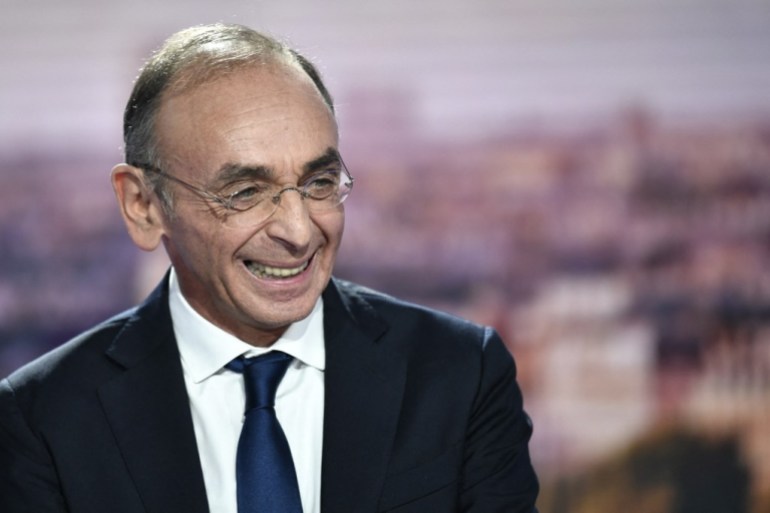
Valerie Pecresse
The candidate for the traditional right-wing party of Les Republicains (LR) has had a woeful campaign run. After a surprise primary win for her party, which was the political home for former presidents Nicolas Sarkozy and Jacques Chirac, Pecresse became its first female candidate.
The 54-year-old former budget minister has accused Macron of overspending and being soft on crime. She said she would control France’s national borders and violent city ghettos, but at 9 percent, her campaign has struggled to gain traction, and a disastrous first significant rally in February dented her credibility.
“She campaigned on very right-wing topics,” Marliere said, adding that the result was counterproductive and managed to alienate her constituents. “Some of her voters decided to support Macron, and others joined Le Pen. It hasn’t been a great campaign for Pecresse at all.”
